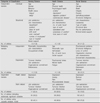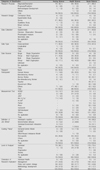1. Anderson E, McDonald DD, Mikky I, Brewer T, Koscizewski C, LaCoursiere S, et al. Health care implications and space allocation of research published in nursing journals. Nurs Outlook. 2003. 51(2):70–83.
http://dx.doi.org/10.1016/S0029-6554(02)05451-9.
2. Baltes PB, Baltes MM. Baltes PB, Baltes MM, editors. Psychological perspectives on successful aging: The model of selective optimization with compensation. Successful aging: Perspectives from the behavioral sciences. 1990. New York: Cambridge University Press;1–34.
3. Burns N, Grove SK. The practice of nursing research: Conduct, critique and utilization. 1993. 2nd ed. Philadelphia: Saunders.
4. Chang SJ, Koh SB, Kang DM, Kim SA, Kang MG, Lee CG, et al. Developing an occupational stress scale for Korean employees. Korean J Occup Environ Med. 2005. 17:297–317.
5. Choe MK, Park OS. The state of art, problems, tasks, and prospects of research in organizational behavior. Korean J Manage. 1993. 2(1):1–74.
6. Choi SR, Jung HS. An analysis of studies on clinical nurses' job stress. Korean J Occup Health Nurs. 2004. 13(1):40–47.
7. Chung YK, Kim HR, Park SY, Hong JY, Koh SB, Chang SJ. The effect of job stress on unemployment. Korean J Occup Environ Med. 2007. 19(2):115–124.
8. Glasser W. Counseling with choice theory: The new reality therapy. 2000. New York: HarperCollins Publishers.
9. Harrison RV. Cooper CL, Payne R, editors. Person-environment fit and job stress. Stress at work. 1978. New York: Wiley;175–209.
10. Herzlinger R. Market driven health care: Who wins, who loses in the transformation of America's largest service industry. 1997. New York: Perseus Books.
11. Kang DM, Koh SB, Kim SA, Kim SY, Kim YJ, Park JS, et al. Job stress: Work-related stress. 2005. Seoul: Korea Medical Book Publisher.
12. Kang MS, Song BS. A study on the predictive, consequent, and moderating factors to analyze the job stress of emotional workers. Paper presented at the meeting of the Korean Academic Society of Business Administration. 2008, August; Jeju:
13. Kassarjian HH. Content analysis in consumer research. J Consum Res. 1977. 4(1):8–18.
14. Kim JH, Yoon SN. An analysis of studies of workers' stress conducted in Korea from 1981 to 2000. J Korean Community Nurs. 2002. 13:618–628.
15. Kim JH. A review of studies on the job stress management interventions (SMIs) conducted from 1991 to 2004. Korean J Occup Health Nurs. 2007. 16(1):15–27.
16. Kim MJ, Gu MO. The development of the stress measurement tool for staff nurses working in the hospital. J Nurs Acad Soc. 1984. 14(2):28–37.
17. Klein KJ, Dansereau F, Hall RJ. Levels issues in theory development, data collection, and analysis. Acad Manage Rev. 1994. 19(2):195–229.
18. Ko YK, Kang KH. A study on the relationship between self-efficacy, collective-efficacy and job stress in the nursing staff. J Korean Acad Nurs Adm. 2006. 12:276–286.
19. Lee KM. Evolution of organizational analysis in the Korean Journal of Management, 1992-2007. Korean J Manage. 2008. 16(3):161–211.
20. Lee MH. Analysis of studies on work stress in clinical nurses. J Korean Acad Adult Nurs. 1996. 8(1):180–200.
21. Mantzoukas S. A review of evidence-based practice, nursing research and reflection: levelling the hierarchy. J Clin Nurs. 2008. 17(2):214–223.
23. Ministry of Strategy and Finance. National competitiveness report 2010. 2010. 12. Seoul: Author.
24. National Institute for Occupational Safety and Health. Issue No. 99-101. Stress at work. 1999. 01. Cincinnati, OH: Author.
26. Rizzo JR, House RJ, Lirtzman SI. Role conflict and ambiguity in complex organizations. Adm Sci Q. 1970. 15(2):150–163.
27. Shin HS, Hyun MS, Ku MO, Cho MO, Kim SY, Jeong JS, et al. Analysis of research papers published in the Journal of the Korean Academy of Nursing - focused on research trends, intervention studies, and level of evidence in the research. J Korean Acad Nurs. 2010. 40(1):139–149.
http://dx.doi.org/10.4040/jkan.2010.40.1.139.
28. Shirey MR. Stress and coping in nurse managers: A qualitative description. 2009. Indiana, USA: Indiana University;Unpublished doctoral dissertation.
30. Suh YO, Park JS, Yang JH, Kim HW, Suk MH, Shin HS, et al. Analysis of research papers published in the Journal of Korean Academy of Nursing. J Korean Acad Nurs. 2007. 37:1013–1019.
31. Thoits PA. Kaplan HB, editor. Dimensions of life events that influence psychological distress: An evaluation and synthesis of the literature. Psychosocial stress: Trends in theory and research. 1983. New York: Academic Press;33–103.
32. Yom YH, Yee JA, Ko JW. The effect of job stress and organizational climate on the organizational effectiveness of hospital nurses. J Korean Acad Nurs. 2002. 8:605–614.






 PDF
PDF ePub
ePub Citation
Citation Print
Print




 XML Download
XML Download